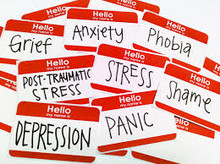Location
Address:
ELEMENTARY: 2839 49 St SW, T3E 3X9
SECONDARY: 5029 26 Ave SW T3E 0R5 , Calgary, Alberta
Phone: (403) 242-2896

February 2016:
PARENTS PROMOTING POSITIVE MENTAL HEALTH
Children today are experiencing more stress and anxiety than ever before. It is important for parents to support your children’s mental wellness by:
Asking and really listening to your child, how he is feeling and listening to his feelings, this is an important way of building trust.
Think about how you speak to your child. When you are angry, calling your child names can lead to low self-esteem, low self-confidence, cause problems at home or at school. It also hurts your relationship with your child.
Give your child choices and respect his wishes
Ask questions that help your child solve problems on his own.
When parents hear their child has a problem, it’s tempting to take over and solve it. But this does not help your child to find solutions on his own. Try asking questions that will help him solve his own problems “What do you think you can do about this?” or “If you choose this, what do you think might happen?”
Encourage sharing and helping
There are many ways to do this. Give your child tasks that are appropriate for his age, such as feeding the family pet, getting the mail, making his bed. Together you can volunteer or help a neighbor. This builds self-confidence and teaches your child that what he does can make a difference in the lives of others.
Read books and stories together.
You are in close contact with your child, stories can show us how people can deal with issues like handling conflict, making or losing friends. Talk to your child about what he likes to read.
Focus on strengths
When your child brings home a test, talk first about what he did well instead of focusing on mistakes. Then ask him what he could do to improve. Help him if he needs suggestions.
CHILDREN’S MENTAL HEALTH
Children’s mental health is an important part of their overall health and well-being.
It should be given thought and attention and, when needed, professional help.
General Tips for Promoting Mental Health
The best way to promote children’s mental health is to build up their strengths, help to protect them from risks, and give them tools to succeed in life.
Help children relate to others and build their confidence. Give children a chance to talk about experiences and feelings; offer encouragement and praise; acknowledge positive and negative behavior; and provide consistent and fair expectations with clear consequences for misbehavior.
Encourage exercise and sports. Researchers have linked a variety of psychological benefits to exercise, including decreased depression and anxiety, and improved mood states, self-confidence, sense of life-quality, and general psychological well-being. Participation in exercise and sports has also been shown to reduce delinquent behavior and boost academic performance.
Suggest involvement in after-school activities. A questionnaire on body image and self-esteem found that girls who were active in a greater number of after-school activities had higher body image, self-esteem, and feelings of competence than girls who participated in fewer.
Encourage strong family relationships. Researchers at Baylor College of Medicine in Houston, found that adolescents who were from closely knit families and maintained an intimate connection with their parents based on trust and open communication were less likely to use alcohol.
Realistic high expectations can go a long way. Studies indicate that realistic high parental or family expectations for a child’s performance may serve as a protective factor against child substance abuse.
Tips for Parents and Caregivers
Recognize that your children’s mental health is just as important as their physical health.
Spend time with your children daily, listening to them and talking to them about what is happening in their lives.
Provide unconditional love and support to your children.
Talk about emotions and feelings with your child.
Educate yourself about children’s mental health.
Teach and model tolerance and understanding about mental illness.
If you’re concerned about your child’s mental health, consult with their teachers, guidance counselor, or other adults that may have information about your child’s behavior.
If you think there might be a problem, seek professional help.
If treatment is needed, a comprehensive plan should be developed including the child.
Address:
ELEMENTARY: 2839 49 St SW, T3E 3X9
SECONDARY: 5029 26 Ave SW T3E 0R5 , Calgary, Alberta
Phone: (403) 242-2896